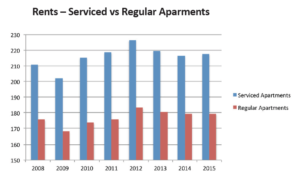Foreign business leaders in China have in recent years noted that it is becoming more difficult to compete against local enterprises. Some point to what they consider unfair subsidies or business practices, and foreign governments and chambers of commerce have long lobbied Beijing to level the playing field with regards to specific issues.
Yet nowadays many agree that the biggest reason for the gains of Chinese enterprises is not unfair advantages; it is simply that these companies have become increasingly great at what they do.
Hot companies and red-hot markets
Xiaomi is perhaps the exemplar par excellence of an outstandingly competitive local firm. It started out offering a decent product that was incredibly inexpensive. Nowadays Xiaomi prices, while no longer rock-bottom, are still often lower than what more renowned brands are charging, yet consumers now mostly choose Xiaomi devices not for price but for their quality, innovation, and simple and elegant designs.
Xiaomi’s ascent to the top of the consumer electronics sector has been emulated by domestic enterprises in all kinds of other industries. Tough new competitors seem to pop up regularly, and foreign companies everywhere are feeling the heat.
Fair playing field: field of dreams?
We find all this interesting in light of what we see on a daily basis helping companies find, rent and buy properties in China. Repeatedly, we see local governments offering to foreign firms – both those new to China and those longestablished in the country – incentives that are as good as or better than the ones offered to domestic enterprises. Foreign direct investment (FDI) has long been a big KPI for any city’s top leadership; the extra generosity of the incentives is what’s new.
Of course FDI incentives alone don’t guarantee a level playing field. But domestic firms in any country will always have certain inherent advantages: stronger affinities with customers and suppliers, connections in society and
government and so on.
Foreign firms should continue to press for a level playing field in China on specific issues where merited. But in our view the crux for surviving and thriving in the country today is competitiveness. Foreign firms need to accordingly direct the bulk of their energy to strengthen their businesses in every respect.

Notching it up a level
The best ways to boost competitiveness varies by firm, but two universal methods are reducing corporate bureaucracy and reducing waste. Just in our little corporate real estate corner of the world there is often a lot of low hanging fruit of this type: finding new uses for unused space, a big portfolio adjustment such as a property sale that management has long recognized as a good idea yet hasn’t executed simply due to inertia.
During China’s hyper-fast growth years, a renowned brand name and novel image were sufficient to power the businesses of many foreign firms; now these are no longer enough. Local enterprises learned much from their foreign counterparts over the years. Regarding competitiveness, perhaps it’s time the foreigners learn a thing or two from the locals.





